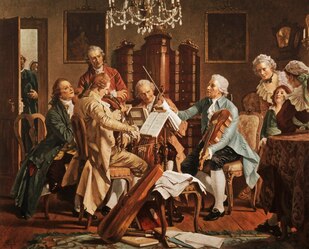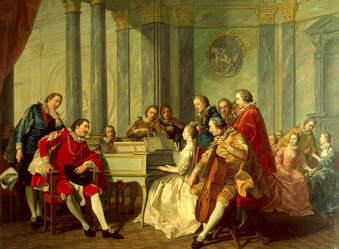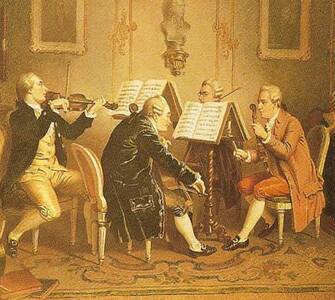Chamber music is a form of classical music composed for and played by a small ensemble. Traditionally, it would be played in a "chamber" setting such as a palace or large room.
|
Sometimes referred to as "the music of friends", playing chamber music requires special skills such as leadership, collaboration, awareness, responsibility, resilience, openness, and empathy—different from the skills required for playing solo or symphonic works. Johann Wolfgang von Goethe described chamber music (specifically, string quartet music) as "four rational people conversing".
|
Composer inspiration ~
|
"Neither a lofty degree of intelligence nor imagination nor both together go to the making of genius. Love, love, love, that is the soul of genius." - Wolfgang Amadeus Mozart (1756-1791)
“Music is a higher revelation than all wisdom and philosophy. Music is the electrical soil in which the spirit lives, thinks and invents.” - Ludwig van Beethoven (1770-1827)
“People often complain that music is too ambiguous, that what they should think when they hear it is so unclear, whereas everyone understands words. With me, it is exactly the opposite, and not only with regard to an entire speech but also with individual words. These, too, seem to me so ambiguous, so vague, so easily misunderstood in comparison to genuine music, which fills the soul with a thousand things better than words. The thoughts which are expressed to me by music that I love are not too indefinite to be put into words, but on the contrary, too definite.“ - Felix Mendelssohn (1809-1847)
"This is what I think art is and what I demand of it: that it pull everyone in, that it show one person another's most intimate thoughts and feelings, that it throw open the window of the soul." - Felix. Mendelssohn (1809-1847)
"Put all your soul into it, play the way you feel!" - Frederic Chopin (1810-1849)
“To send light into the darkness of men's hearts - such is the duty of the artist.” - Robert Schumann (1810-1856) |
"Joy is not in things; it is in us." - Richard Wagner (1813-1883)
"I am convinced that there are universal currents of Divine Thought vibrating the ether everywhere and that any who can feel these vibrations is inspired." - Richard Wagner (1813-1883)
“The music of the people is like a rare and lovely flower growing amidst encroaching weeds. Thousands pass it, while others trample it under foot, and thus the chances are that it will perish before it is seen by the one discriminating spirit who will prize it above all else. The fact that no one has as yet arisen to make the most of it does not prove that nothing is there.” - Antonín Dvořák (1841-1904)
“Listen to no one's advice except that of the wind in the trees. That can recount the whole history of mankind...” - Claude Debussy (1862-1918)
"What is Music? How do you define it? Music is a calm moonlit night, the rustle of leaves in Summer. Music is the far off peal of bells at dusk! Music comes straight from the heart and talks only to the heart: it is Love! Music is the Sister of Poetry and her Mother is sorrow!" - Sergei Rachmaninoff (1873-1943)
"Music, I feel, must be emotional first and intellectual second." - Maurice Ravel (1875-1937)
|
How it all began
As early as the Renaissance and Baroque eras, secular music was being played in private homes. Depending on the number of players these ensembles were called trios, quartets, quintets, etc. Chamber compositions were primarily written for strings, however could include piano, winds, and other instrumentation. When orchestras began to grow significantly in size, chamber music took on a new meaning and is still currently defined as music written for and performed by a small instrumental ensemble with one player on each part. In the late 1700s and early 1800s, Haydn, Mozart and Beethoven created the modern form of chamber music, during what is known as the Viennese Classic Era.
Mozart's string quartets are considered the pinnacle of the classical art. The six string quartets that he dedicated to Haydn, his friend and mentor, inspired the elder composer to say to Mozart's father, "I tell you before God as an honest man that your son is the greatest composer known to me either in person or by reputation. He has taste, and, what is more, the most profound knowledge of composition."[2]
Changes in society and music technology during the early 19th century had a profound effect on the way chamber compositions were written and played. It was around this time that Beethoven revolutionized chamber music, ascending it to a higher dimension. His late quartets were so intimidating an achievement that other composers struggled to write anything that felt worthy of following what he had created.
Franz Schubert's bridged the Classical and Romantic periods.
Mozart's string quartets are considered the pinnacle of the classical art. The six string quartets that he dedicated to Haydn, his friend and mentor, inspired the elder composer to say to Mozart's father, "I tell you before God as an honest man that your son is the greatest composer known to me either in person or by reputation. He has taste, and, what is more, the most profound knowledge of composition."[2]
Changes in society and music technology during the early 19th century had a profound effect on the way chamber compositions were written and played. It was around this time that Beethoven revolutionized chamber music, ascending it to a higher dimension. His late quartets were so intimidating an achievement that other composers struggled to write anything that felt worthy of following what he had created.
Franz Schubert's bridged the Classical and Romantic periods.
|
|
© Galatea Chamber Music 2024





